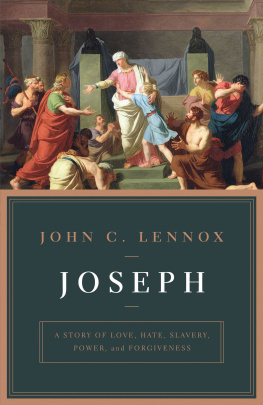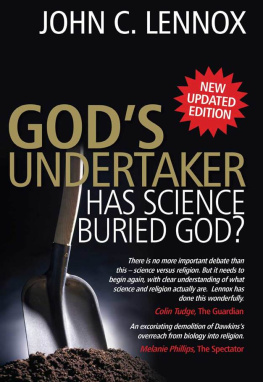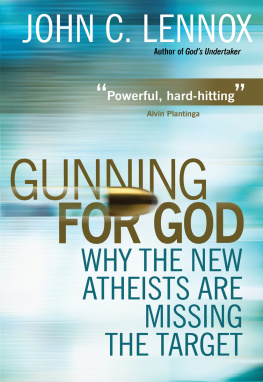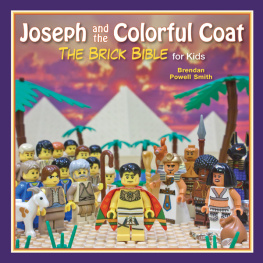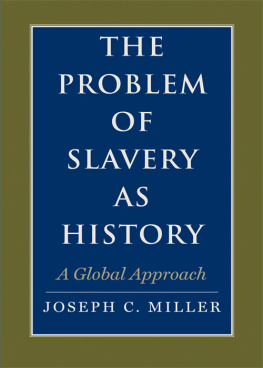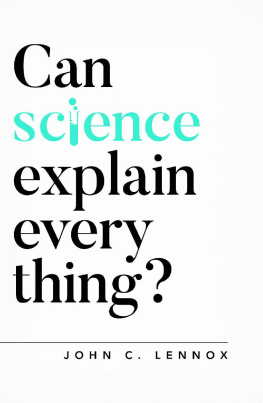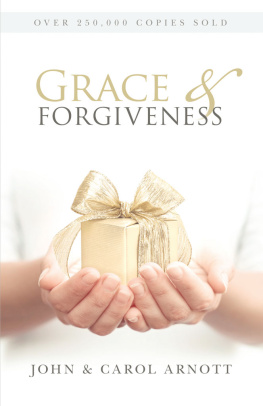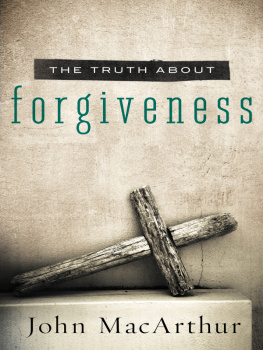John C. Lennox - Joseph: A Story of Love, Hate, Slavery, Power, and Forgiveness
Here you can read online John C. Lennox - Joseph: A Story of Love, Hate, Slavery, Power, and Forgiveness full text of the book (entire story) in english for free. Download pdf and epub, get meaning, cover and reviews about this ebook. year: 2019, publisher: Crossway, genre: Religion. Description of the work, (preface) as well as reviews are available. Best literature library LitArk.com created for fans of good reading and offers a wide selection of genres:
Romance novel
Science fiction
Adventure
Detective
Science
History
Home and family
Prose
Art
Politics
Computer
Non-fiction
Religion
Business
Children
Humor
Choose a favorite category and find really read worthwhile books. Enjoy immersion in the world of imagination, feel the emotions of the characters or learn something new for yourself, make an fascinating discovery.
- Book:Joseph: A Story of Love, Hate, Slavery, Power, and Forgiveness
- Author:
- Publisher:Crossway
- Genre:
- Year:2019
- Rating:3 / 5
- Favourites:Add to favourites
- Your mark:
- 60
- 1
- 2
- 3
- 4
- 5
Joseph: A Story of Love, Hate, Slavery, Power, and Forgiveness: summary, description and annotation
We offer to read an annotation, description, summary or preface (depends on what the author of the book "Joseph: A Story of Love, Hate, Slavery, Power, and Forgiveness" wrote himself). If you haven't found the necessary information about the book — write in the comments, we will try to find it.
Joseph: A Story of Love, Hate, Slavery, Power, and Forgiveness — read online for free the complete book (whole text) full work
Below is the text of the book, divided by pages. System saving the place of the last page read, allows you to conveniently read the book "Joseph: A Story of Love, Hate, Slavery, Power, and Forgiveness" online for free, without having to search again every time where you left off. Put a bookmark, and you can go to the page where you finished reading at any time.
Font size:
Interval:
Bookmark:
The story reached the ears of Pharaoh, and he showed himself magnanimous, instructing Joseph to offer his father and family the very best of the land in Egypt. Presumably Pharaoh was more than grateful for Josephs economic wonder, which was in process of saving the empire from starvation, to say nothing of helping Pharaoh retain his own power base. At Pharaohs command, Joseph ordered wagons to provide transport for all of Jacobs family and retinue and sent his brothers back to Canaan with a warning not to quarrel on the way. Joseph had no illusions regarding them; their journey was not yet over. Nor was that of the nation of Israel, which would spring from Jacobs family. Joseph did not realize that the generosity flowing from Egypt to his family would one day result in a four -h undred -y ear slavery from which the nation of Israel would one day have to be delivered. All that future hardship was veiled from them, but the decision that would lead to it was made that day.
There are subtle differences between what the two rulers of Egypt, Joseph and Pharaoh, offered to Jacobs family. Both asked them, indeed, commanded them to come down to Egypt, but Joseph suggested that they come and live separated from the Egyptians by forming an enclave in the district of Goshen in the fertile eastern Nile Delta. Pharaoh, by contrast, repeatedly offered them the best of the land of Egypt. Joseph urged his father to come with all his flocks and possessions, whereas Pharaoh told them to leave all their stuff behind and not to regret it.
These differences raise a very important question: would Israel be assimilated completely into Egypt and lose all its distinctiveness, as Pharaoh seems to wish, or can the Seed Project, the vision of Abraham, be preserved by Israels keeping its cultural identity, living as a nation within a nation? Assimilation versus separation is an issue that has already raised its head in Genesis and will recur throughout the entire history of Israel.
Pharaoh may well have imagined that Joseph had himself been completely assimilated and therefore so too should his family. Perhaps that tension is reflected in the fact that there are two distinct descriptions of Jacobs sons in this text. They are called both Josephs brothers and the sons of Israel. What is clear is that Pharaoh had different ideas from Joseph, and so eventually would one of his successors who did not know Joseph (Ex. 1:8).
They were soon sent on their journey with ample provisions, though here once more Joseph differentiated between Benjamin and the others by giving him five changes of clothes and three hundred pieces of silver. It is almost as if he was returning to Benjamin the clothes that had once been torn from him and giving him silver in return for the silver the other brothers had obtained for Joseph. Joseph was favoring Benjamin as once his father had favored himwith what ultimate consequence, we may well wonder.
Not surprisingly Jacob was stunned when he got the news that Joseph was alive and was ruler of Egypt. At first he did not believe it: his heart became numb (Gen. 45:26). We can imagine that the man was at risk of a heart attack. Judah had warned that the loss of Benjamin would kill the old man; the knowledge that Joseph was still alive nearly did. It was a heart -s topping shock.
However, when the brothers reported what Joseph had said, and when Jacob saw the tangible evidence of wealth in the wagons standing in his courtyard, he rapidly came back to life and decided to go and see his long -l ost son before he died. He would once more be a father to and for his son.
On his journey Jacob stopped at Beersheva, a place that was of great significance to him and his family. It was where his grandfather Abraham had gone after the drama of binding his son Isaac. It was there that God had appeared to Isaac, and it was from there that Jacob had set out on his travels years before. So Jacob stopped and offered a sacrifice to God. And God broke his silence of twenty-two years and spoke to Jacob for the first time since Joseph was a boy. The language, as Jacob probably knew, was similar to that used in Gods speech to Abraham when he told him to offer up his son Isaac. God called to him in a vision of the night:
And God spoke to Israel in visions of the night and said, Jacob, Jacob. And he said, Here I am. Then he said, I am God, the God of your father. Do not be afraid to go down to Egypt, for there I will make you into a great nation. I myself will go down with you to Egypt, and I will also bring you up again, and Josephs hand shall close your eyes. ( 46:24 )
It was a momentous move that Jacob was about to take, as historically important as Abrahams departure from Ur of the Chaldeans to travel to the Promised Land. And in light of the subsequent history of Israel in Egypt, as described in the book of Exodus, what God said to Jacob is remarkable. It seems calculated to reassure Jacob about his immediate next step: he should not fear to take Josephs advice and move to Egypt, for there the Seed Project of making Israel a great nation would be realized. The fact that this would happen in Egypt is a new part of the biblical revelation.
There is no hint that Joseph feared that the nation would be assimilated into Egypt and lose its cultural identity. Neither is there any indication of the fact that such assimilation would be avoided by Israel becoming a nation of slaves to subsequent pharaohs. God simply promised that he would go down with Jacob to Egypt and bring him up again and that Joseph would be with him when he died. Did God mean bring him back to Canaan in a coffin, or did he mean eventually bring the nation back under Moses?
Jacob must have known what God had said to his grandfather Abraham when he made the covenant with Abraham regarding his posterity:
Then the L ord said to Abram, Know for certain that your offspring will be sojourners in a land that is not theirs and will be servants there, and they will be afflicted for four hundred years. But I will bring judgment on the nation that they serve, and afterward they shall come out with great possessions. As for you, you shall go to your fathers in peace; you shall be buried in a good old age. And they shall come back here in the fourth generation, for the iniquity of the Amorites is not yet complete. ( 15:1316 )
Gods message to Abraham concerned the distant future, and Jacob was surely aware of every detail of the making of the covenant, including this prediction that Abrahams, and therefore Jacobs, descendants would go to a foreign land and suffer four hundred years affliction. And here Jacob was about to make such a move, and God was encouraging him to make it without explicitly reminding him of the darkly foreboding prediction of suffering that it entailed. Joseph also must have heard in his childhood the detail of Gods covenant with Abraham as central to the familys great calling. Yet there is no hint in the narrative that he had any recollection of it.
And even if they had thought of it, what difference would or could it have made? Maybe these thoughts were somewhere in the back of Jacobs mind. Whatever the answer, God did not leave him any option in the matter: he told him to go down. But God did not tell him everything. Also, such specific guidance appears to be very rare. Indeed, we notice the same phenomenon in the life of the apostle Paul, as recorded in Acts. Only seldom does God speak directly to him.
We might well ask, we who are neither Jacob nor Paul, what principle there is to be found here that might apply to us. There is at least one right on the surface. The guidance in these rare incidents is usually concerned with what to do or what will happen and is special because a historic turning point has been reached. Here, Israel was to go to Egypt, and in Acts, Paul was to go to Europe.
Font size:
Interval:
Bookmark:
Similar books «Joseph: A Story of Love, Hate, Slavery, Power, and Forgiveness»
Look at similar books to Joseph: A Story of Love, Hate, Slavery, Power, and Forgiveness. We have selected literature similar in name and meaning in the hope of providing readers with more options to find new, interesting, not yet read works.
Discussion, reviews of the book Joseph: A Story of Love, Hate, Slavery, Power, and Forgiveness and just readers' own opinions. Leave your comments, write what you think about the work, its meaning or the main characters. Specify what exactly you liked and what you didn't like, and why you think so.

